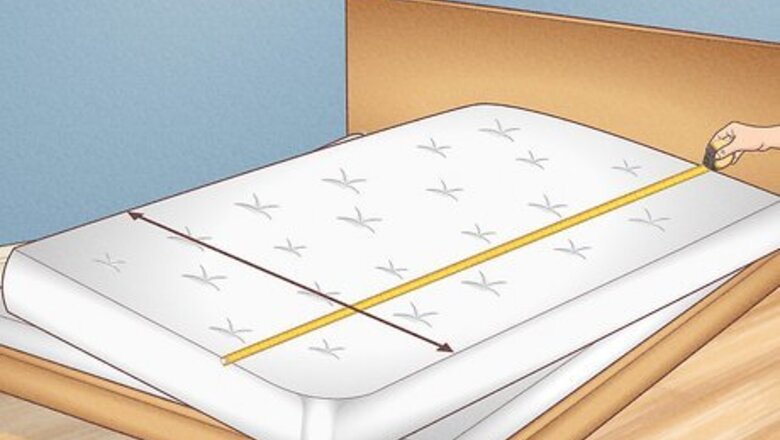
views
- Wrap your mattress in a mattress bag and clear a path to the vehicle before moving it. If possible, ask a friend to help you.
- Move the mattress yourself by pushing it with a dolly or sliding it across cardboard sheets. With a friend’s help, lift the mattress from your legs and carry it.
- Pull a mattress upstairs with help, or use an old blanket to slide it. Gently push a mattress downstairs, angling it against the wall and letting gravity guide it.
- Load the mattress into your car or moving van, laying it flat whenever possible. Fasten it on top of a car with ratchet straps or store it on the floor of a truck.
Moving the Mattress
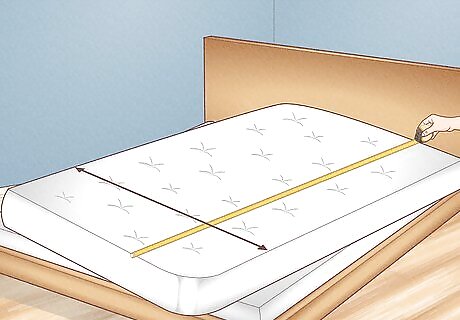
Measure the mattress to determine the best method for moving it. Using a tape measure, find the dimensions of your mattress (length, width, and height). It’s important to know your mattress’s measurements to figure out how much space you’ll need to move it, what size mattress bag will fit it, and how much space you’ll need in the car or truck to store it. Even if you know your mattress’s standard size (twin, double, full, queen, or king), knowing the exact dimensions is still helpful to the moving process. Depth especially can vary for mattresses, though most are between 8 inches (20 cm) and 14 inches (36 cm) thick.
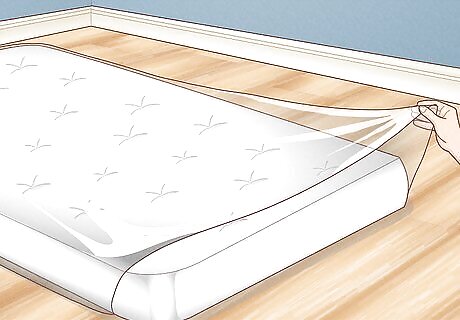
Seal the mattress in a plastic mattress bag for protection. Start by stripping the mattress and lifting it off the bed frame or box spring. Then, slip the mattress into the mattress bag and seal it with packing tape. Fold down the edges of the bag with tape, and tape around the top, middle, and bottom of the mattress in a crisscross pattern to ensure the bag stays secure. If you’re moving the mattress yourself, consider double-bagging it. You’ll likely end up dragging the mattress at least part of the way, which can erode a mattress bag. If you have a box spring, wrap it up the same way. Most mattress bags come in packs of 2, so you should have enough for both. Mattress bags are typically sold according to standard bed sizes, but it’s still important to know your mattress’s depth to ensure it’ll fit in the mattress bag.
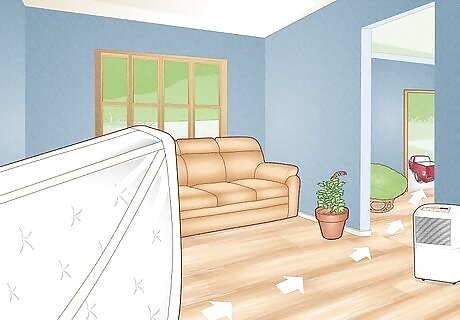
Clear a path from the mattress to the moving vehicle. Walk the path you plan to get your mattress out of the house and into a vehicle. Look for possible obstructions and clear them out of the way, including power cords, hanging pictures, breakable objects like lamps, and anything else that might get damaged if your mattress hits it. Prepare your vehicle, too. If you’re going to put the mattress inside the car or truck, clear enough space inside the vehicle, open the doors, and push down seats for additional space if applicable. Make a note of any obstacles you’ll have to get the mattress over, too, like a curb, porch, or doorstep.
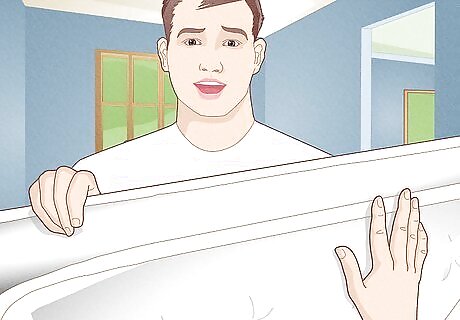
Get a helping hand to assist you in moving the mattress if possible. You can absolutely move a mattress by yourself, but it’s easier when you have someone else helping you carry it. Mattresses are heavy and can flop around when moved, so it’s recommended to do it with 2 or 3 people. Ask a few friends or family members if they’d be willing to come over and help you! If you can’t get someone you know to help, you can always hire hourly professional movers or freelance helpers through services like TaskRabbit and Handy. If you choose to move a mattress without help, ensure you have either a dolly or several large pieces of cardboard to help you along the way. You can rent a dolly from most hardware stores or moving truck rental companies.
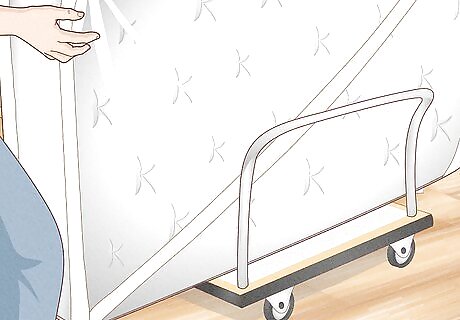
Push the mattress with a dolly to move it by yourself. Start by turning your mattress until it’s upright on its side, and load it onto the dolly. From there, you can roll the dolly out to the vehicle! If your mattress is floppy, reinforce it by placing two large cardboard sheets on either side and fastening them in place with tie-down straps before attempting to move it on the dolly. If you have a soft memory foam mattress less than 11 inches (28 cm) thick, fold it in half and fasten it in place with ratchet straps before loading it onto the dolly. Be sure to keep the side you sleep on inside the fold.
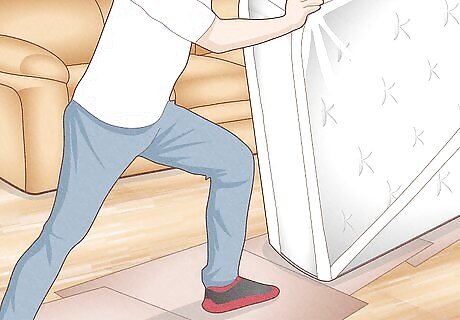
Flip the mattress on its side horizontally and slide it with cardboard. You can still move a mattress without a dolly; it requires a little more dragging and pulling. Rotate the mattress onto its side and slip a large piece of cardboard underneath it. Then, keep laying down cardboard sheets along the path to your vehicle and slide the mattress out of your home. Secure your mattress if you use this method as well. Support a floppy mattress by fastening pieces of cardboard to either side or fold a memory foam mattress in half before sliding it out to the vehicle.
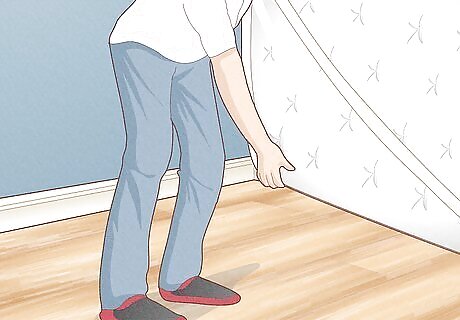
Carry the mattress by its corners if you have a helper. Stand at one end of the mattress and have your helper stand at the other. Rotate the mattress onto its side horizontally, then firmly grasp it under its bottom corner. Bend your knees and lift the mattress from your legs to minimize strain. Hold the mattress close to your body as you move, but don’t lift it above shoulder height. If you stand up and lift with your back, you could strain your muscles and hurt yourself. Before walking, figure out who will move backwards and will go forward—and be sure you’re stable before taking a step! Communicate verbally with your helper to ensure you both stand and lift the mattress simultaneously. That prevents one of you from picking up more weight than the other.
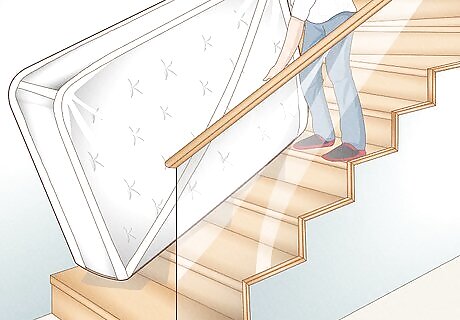
Align the mattress next to a wall and guide it down stairs. If you have to deal with stairs while moving your mattress, come to a complete stop at the top of them. With the mattress on its side horizontally, align it with the wall or stair rail and stand behind it. Gently tilt the mattress, holding it firmly, and guide it down the stairs from above. Let gravity do most of the work here; all you have to do is steer! If you’re using a dolly, lift the mattress off of it before navigating down the stairs. Don’t use the dolly on stairs—it’s easier to control the mattress by simply sliding it.

Move a mattress upstairs with an old blanket or get a helper. The best way to get a mattress (especially a larger king or queen size) is with another person helping: hold up each end of the mattress, lift with your legs, and move in small increments. If you’re on your own, slide an old blanket underneath the mattress and pull it upstairs, using the blanket to keep your mattress moving. If you’re working with someone else, coordinate with them so that whoever is facing forward alerts the person moving backward as they’re about to reach the first stair. While moving a mattress upstairs by yourself, don’t stand behind it as you move it for your safety. Pause and rest when you need to while holding the mattress in place or leaning it against the wall.
Loading and Securing the Mattress
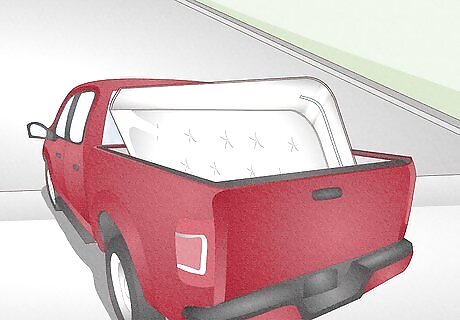
Load the mattress into the back of a car or truck if there’s room. Try to fit the mattress into your car if it’s a smaller twin-size (or a foam mattress that folds) since it’ll be more secure than tying your bed to the car's roof. Slide the mattress into the back of your car through the trunk and lay it as flat as possible, pushing down the seats to make room as needed. If you have a pickup truck, lay the mattress in the truck bed as flat as it’ll go and fasten ratchet straps to the truck’s D-rings. Wrap them over the mattress and tie them to the truck’s other slack to hold it in place.
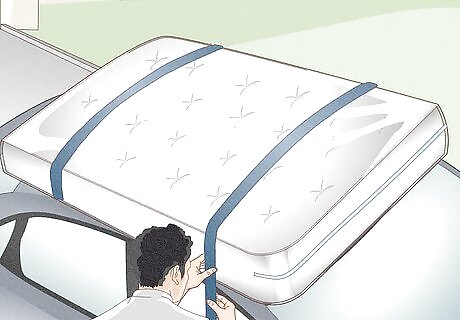
Tie the mattress to the top of a car or SUV for transportation. Lift your mattress and carefully slide it onto the car's roof. The easiest way to carry a mattress on top of your car is with a car roof rack; lay the mattress flat and fasten it directly to the rack with ratchet straps. If you can’t get a roof rack, lay the mattress across the vehicle's roof and tie ratchet straps across its front, center, and back instead. To secure the mattress to the roof of your car, wind the straps through the passenger door and back windows, then back up to the roof. Double-check for tears in the mattress bag after you lift it onto the car roof. Feel free to set the mattress down to rest at any point on your way out to the car if you get tired! Communicate with any helpers before stopping. Transporting a mattress inside the car or using a moving van is best, but this method works if you have a bigger mattress and there’s no room in the car.
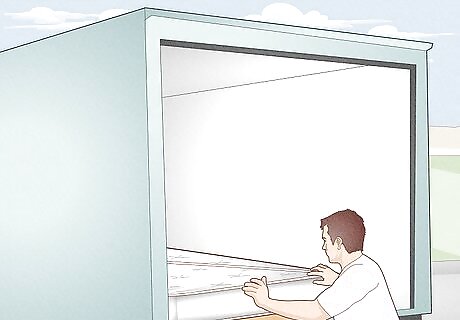
Secure your mattress inside a moving truck or van if you have one. Lift the mattress off the dolly (or ground) and into the moving truck’s cargo hold. Raise one end of the mattress onto the truck first, then push from the back to load it entirely. Lay the mattress flat on the truck's bed without stacking anything on top of it, if possible. This will protect the integrity of your mattress during transport. If you need to stand the mattress up sideways in the moving truck, lean it against a wall and fasten it in place with ratchet straps. If you’re using a moving truck, you might have access to a loading ramp that allows you to slide the mattress into the vehicle. Moving vans and pickup trucks are ideal for transporting mattresses because they offer more space (although you can use any vehicle when necessary).
Unpacking the Mattress
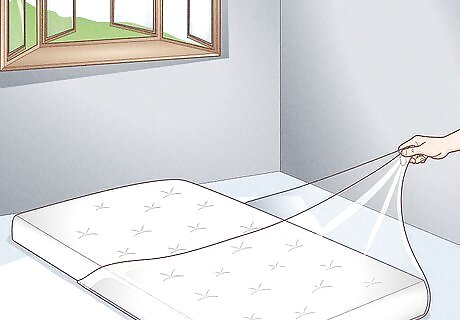
Remove the mattress bag and air out the mattress near an open window. Once you bring your mattress inside, cut away the plastic mattress bag and packing tape with a pair of scissors. Lay your mattress flat next to an open window with direct sunlight. If possible, set your mattress up in a spare room and let it air out while you set up your bed frame and other furniture in the bedroom. Be sure to unwrap your mattress as soon as possible. Don’t let it sit in the mattress bag for hours after moving it to its new home!
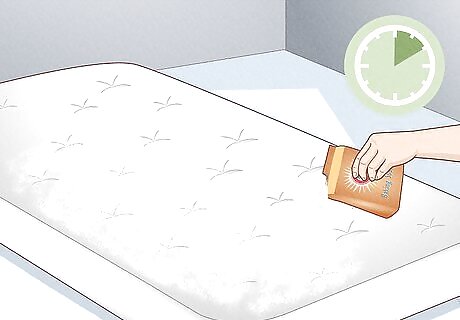
Sprinkle baking soda over the mattress and let it sit for 2 hours. When you set your mattress down to air it out, dust it with baking soda on its surface. Baking soda is a natural deodorizer that can remove scents sticking to your mattress from the move. After 2 hours, come back and vacuum up all of the baking soda. As you sprinkle on the baking soda, inspect your mattress for any pests (bugs, for example) that may have gotten onto the mattress during the move.
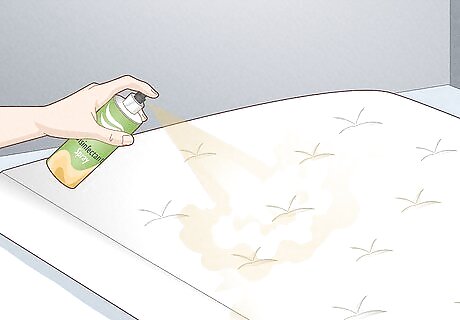
Spray the mattress with disinfectant, wipe it down, and let it dry. Once the baking soda is gone, apply a light mist of disinfectant spray to clean any stray germs off of your mattress. Wipe the surface of the mattress after spraying it with the disinfectant, then leave it to dry completely. After that, your mattress is ready to be set up and used once again!
Storing a Mattress Properly
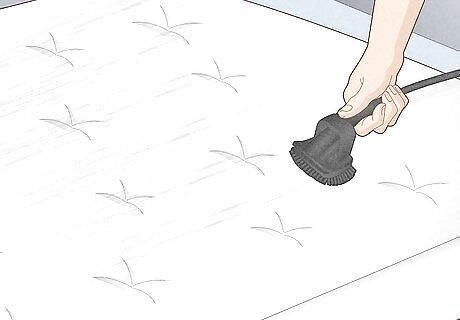
Clean the mattress before and after you put it in storage. A thorough cleaning beforehand ensures your mattress stays in the best condition possible while in storage. Then, clean your mattress after retrieving it to prepare it for use once more. Vacuum the entire mattress and apply disinfectant spray before letting it air dry.
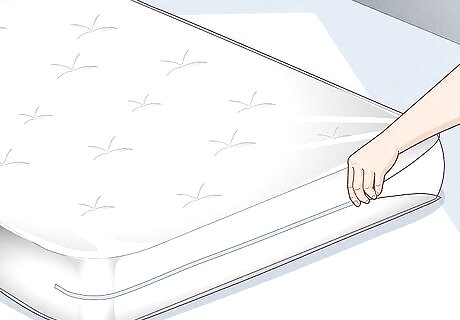
Keep your mattress stored inside a mattress bag for protection. Ensure the mattress is completely dry before you cover it with a mattress bag. Then, when the bag is on, double-check that it’s sealed on all sides with no leaks or tears anywhere. This protects the mattress from dust and contaminants while it’s in storage. If you plan to keep the mattress in storage for a long time, invest in a mold and water-resistant mattress bag for safety.
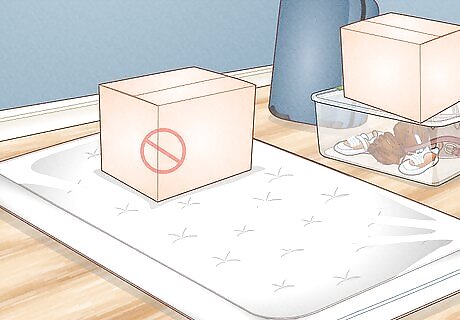
Store the mattress flat without stacking anything on top of it. Keeping a mattress on its side can compromise its interior and ruin it in the long run, regardless of its type. Similarly, stacking things on top of the mattress will also cause damage over time, so it’s best to set aside storage space solely for your mattress. If you have to store the mattress on its side, rotate it to a different side roughly every month to protect it as much as possible.
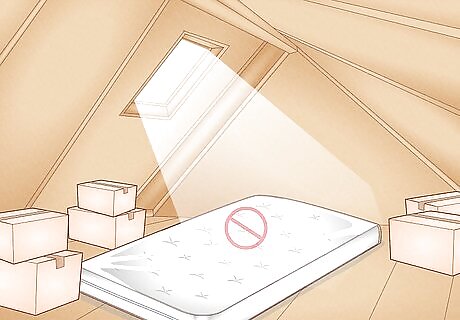
Ensure the mattress is safe from extreme temperatures and humidity. Intense heat, cold, and moisture can all damage a mattress in storage. If you store it at home, keep it in rooms where you can control temperature and moisture, avoiding areas like the garage, attic, and basement. If you store it in a facility, choose a climate-controlled space or leave a portable dehumidifier in the unit.




















Comments
0 comment